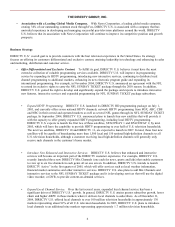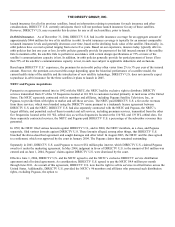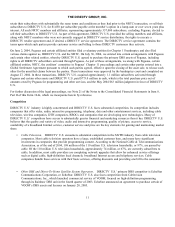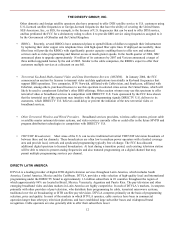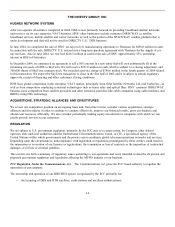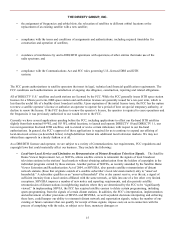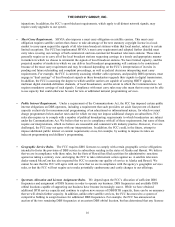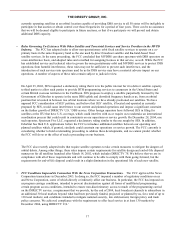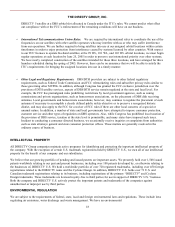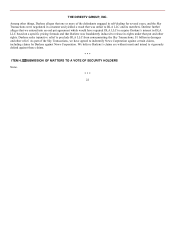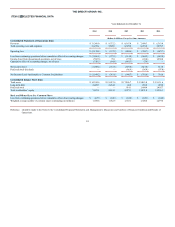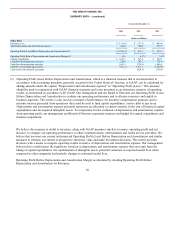DIRECTV 2004 Annual Report Download - page 25
Download and view the complete annual report
Please find page 25 of the 2004 DIRECTV annual report below. You can navigate through the pages in the report by either clicking on the pages listed below, or by using the keyword search tool below to find specific information within the annual report.
THE DIRECTV GROUP, INC.
injunctions. In addition, the FCC’s sport blackout requirements, which apply to all distant network signals, may
require costly upgrades to our system.
•
Must Carry Requirement. SHVIA also imposes a must carry obligation on satellite carriers. This must carry
obligation requires satellite carriers that choose to take advantage of the new statutory copyright license in a local
market to carry upon request the signals of all television broadcast stations within that local market, subject to certain
limited exceptions. The FCC has implemented SHVIA’s must carry requirement and adopted further detailed must
carry rules covering our carriage of both commercial and non-commercial broadcast television stations. These rules
generally require us to carry all of the local broadcast stations requesting carriage in a timely and appropriate manner
in markets in which we choose to retransmit the signals of local broadcast stations. We have limited capacity, and the
projected number of markets in which we can deliver local broadcast programming will continue to be constrained
because of the must carry requirement and may be reduced depending on the FCC’s interpretation of its rules in
pending and future rulemaking and complaint proceedings, as well as judicial decisions interpreting must carry
requirements. For example, the FCC is currently assessing whether cable operators, and possibly DBS operators, must
engage in “dual carriage” of local broadcast signals as these broadcasters upgrade their signals to digital transmission.
In addition, the FCC is assessing the degree to which satellite carriers are capable of carrying HDTV signals, or
multicast digital standard-definition channels, of local broadcasters, and the extent to which the Communications Act
requires mandatory carriage of such signals. Compliance with must carry rules may also mean that we may not be able
to use capacity that could otherwise be used for new or additional national programming services.
•
Public Interest Requirement. Under a requirement of the Communications Act, the FCC has imposed certain public
interest obligations on DBS operators, including a requirement that such providers set aside four percent of channel
capacity exclusively for noncommercial programming of an educational or informational nature, for which we must
charge programmers below-market rates and for which we may not impose additional charges on subscribers. FCC
rules also require us to comply with a number of political broadcasting requirements to which broadcasters are subject
under the Communications Act. We believe that we are in compliance with all of these requirements, but some of them
require our interpretations, which we believe are reasonable and consistent with industry practice. However, if we are
challenged, the FCC may not agree with our interpretations. In addition, the FCC could, in the future, attempt to
impose additional public interest or content requirements on us, for example, by seeking to impose its rules on
indecent programming and children’s programming.
•
Geographic Service Rules. The FCC requires DBS licensees to comply with certain geographic service obligations
intended to foster the provision of DBS service to subscribers residing in the states of Alaska and Hawaii. We believe
that we are in compliance with these rules, but the State of Hawaii has filed a petition for administrative sanctions
against us taking a contrary view, and urging the FCC to take enforcement action against us. A satellite television
dealer named MicroCom has also requested the FCC to examine our quality of service to Alaska and Hawaii. We
cannot be sure that the FCC will agree with our view that we are in compliance with the agency’s geographic services
rules, or that the FCC will not require us to make potentially cumbersome and costly changes to our offerings.
•
Spectrum Allocation and License Assignment Rules. We depend upon the FCC’s allocation of sufficient DBS
frequencies and assignment of DBS licenses in order to operate our business. DBS frequencies and available DBS
orbital locations capable of supporting our business have become increasingly scarce. While we have obtained
additional DTH service capacity and continue to explore new sources of DBS/DTH capacity, there can be no assurance
that we will obtain further capacity. In addition, unlike other satellite services, the FCC has moved to a system of
competitive bidding to assign licenses for additional DBS frequencies. For example, the FCC has announced an
auction of the two remaining DBS frequencies at an eastern DBS orbital location, but has determined that any licensee
16


